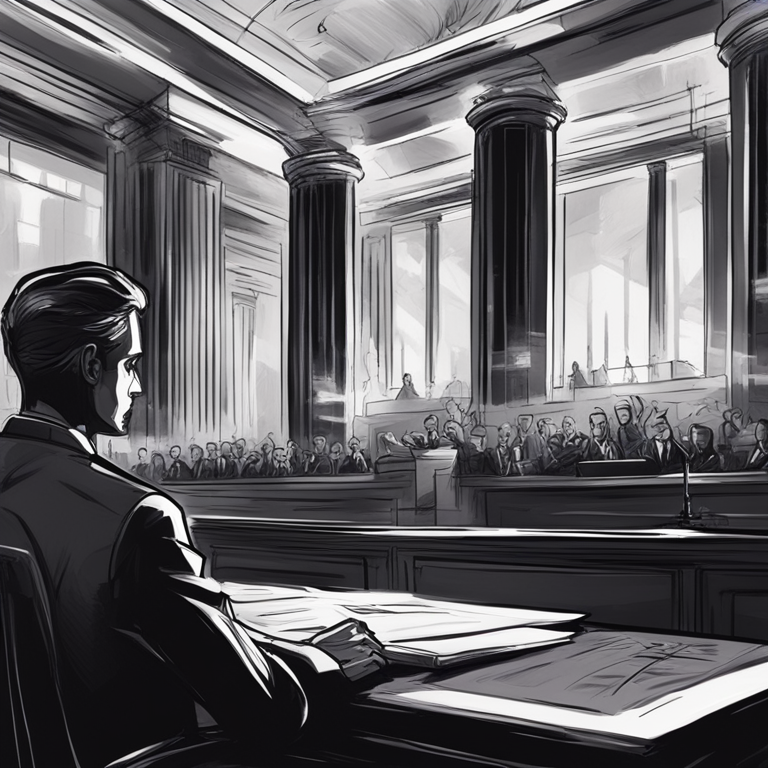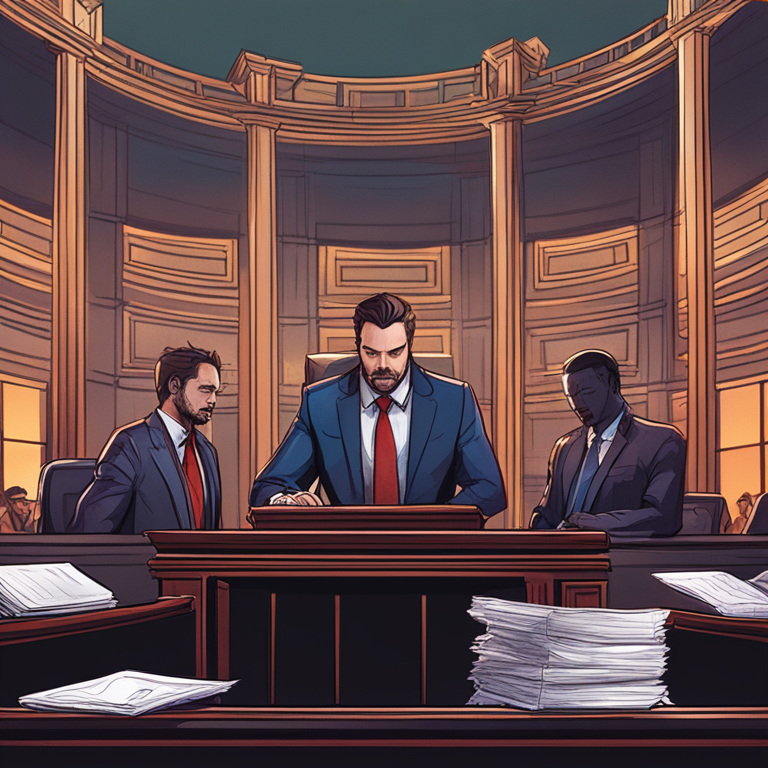Ripple CLO Compares SEC to Kafka's 'The Trial' as XRP Case Saga Continues
- byAdmin
- 14 May, 2024
- 20 Mins

Introduction
Welcome, crypto aficionados and curious readers alike! If you’ve been following the seemingly never-ending drama between Ripple and the U.S. Securities and Exchange Commission (SEC), you might find today’s plot twist particularly riveting. Imagine a legal saga so convoluted and baffling, it could be straight out of a Kafka novel. Yup, Ripple's saga just dialed up the Kafkaesque meter, thanks to its Chief Legal Officer (CLO) Stuart Alderoty.
But what's all the fuss about, and why is everyone suddenly talking literature? Buckle up as we dive into this high-stakes drama, complete with courtroom antics, confidential documents, and a hefty $2 billion price tag. Ready to satisfy your curiosity and maybe even chuckle a bit? Let’s get into it!

Ripple's Comparison to Kafka's 'The Trial'
In a world where blockchain technology collides with legalese, Stuart Alderoty couldn’t help but draw a parallel between the SEC’s handling of Ripple's case and Franz Kafka’s dystopian novel, "The Trial." You know things are getting spicy when a top-tier lawyer whips out Kafka to critique a regulatory body. For those of you who might’ve skipped the book club, Kafka’s "The Trial" is about a man who gets arrested and prosecuted by a remote, inaccessible authority without ever being informed of his crime. Fiction or reality? I’ll let you decide.
Alderoty’s tweet humorously asserts that even Kafka’s protagonist had it better than Ripple during the investigation and Wells Notice process. Now, if the irony isn't delicious enough, Ripple argues that the SEC’s regulatory inconsistencies make navigating this legal labyrinth harder than finding Waldo while blindfolded. Ripple isn’t alone in this sentiment. Other crypto companies, from Robinhood to Coinbase, have faced similar bewildering ordeals in their dance with the SEC.
The SEC is seeking nearly $2 billion from Ripple for selling XRP to institutional investors. In response, Ripple is aiming to keep some sensitive documents under wraps to protect crucial business interests. We're talking secrets so tightly guarded, they may as well be classified; think earnings, revenues, and even discounts on XRP sales. Ripple insists these details, if exposed, could wreak havoc on their operations and relationships with various non-party financial institutions and employees.
Steering clear of a financial apocalypse, Ripple suggests that any civil penalty should cap at $10 million, not the SEC’s staggering $2 billion. It’s a battle of numbers and narratives, and the courtroom is the stage for this unfolding drama.
So, there you have it – Kafka’s literary genius intersecting with the contemporary world of cryptocurrency. Whether you’re here for the courtroom theatrics or just to see how this crypto-legal thriller ends, stay tuned as Ripple and the SEC continue to spar in what could be one of the most pivotal cases in blockchain history.

SEC vs. Ripple
In the ongoing rollercoaster of a legal battle between Ripple and the Securities and Exchange Commission (SEC), Ripple's Chief Legal Officer, Stuart Alderoty, shared a comparison that's a real page-turner. He likened the SEC's handling of their case to the bureaucratic nightmare found in Franz Kafka's "The Trial." For those who snoozed through literature class, Kafka's work is basically about a guy who’s put on trial for something he knows absolutely nothing about—feels relatable, right?
Alderoty's comparison brings a dramatic spotlight to Ripple's argument that they've been treated more unfairly than a turkey at Thanksgiving throughout the investigation and Wells Notice process. Some industry pundits nod in agreement, seeing Ripple's ordeal as part of a larger issue where other crypto champions like Robinhood and Coinbase are also getting a harsh rap from the SEC's ever-changing playbook. It seems navigating SEC regulations these days is as confusing as putting together IKEA furniture without instructions!

Charges and remedies
Currently, the SEC is on Ripple's tail, seeking nearly $2 billion for allegedly selling XRP as unregistered securities to institutional investors. Sounds steep, doesn't it? In legal back-and-forth that would make even the most seasoned law veterans dizzy, Ripple has filed to seal certain tasty bits of documents. The reason? Ripple claims that revealing them could cause significant harm to its business, akin to revealing grandma’s secret cookie recipe to cookie-stealing neighbors. The redactions cover highly confidential details like earnings, revenues, expenses, and the discounts at which XRP was sold to institutions.
Ripple acknowledges that their offering discounts to institutional buyers is of interest but steadfastly refuses to disclose the nitty-gritty financial and pricing terms. Moreover, Ripple is keen on protecting the identities of their financial institutions, customers, and employees, arguing that unmasking these details could harm their standing and potentially dissolve business partnerships like cotton candy in rain. Despite the SEC's monumental $2 billion fine request, Ripple counters that any civil penalty should be pocket change by comparison—not more than $10 million.
Broader implications

Impact on other cryptocurrency firms
This legal showdown isn't just some isolated incident playing out in a dark corner. Ripple's entanglement with the SEC has cast its shadow far and wide, rattling cages across the entire cryptocurrency zoo. Other crypto firms, including big names like Robinhood and Coinbase, are feeling the heat as they try to tiptoe through the SEC's labyrinthine rules and seemingly erratic feedback. Imagine trying to ace a class where the professor changes the syllabus every week—sounds frustrating, doesn't it?
Many argue that the SEC’s heavy-handed approach could stifle innovation and growth in the crypto space. The regulatory uncertainty is like a cloud over these firms, causing hesitation and second-guessing that could keep potential game-changing innovations stuck in the pipeline. This regulatory maze could either lead to stronger, more resilient firms or leave them more confused than ever. It's a high-stakes game, and everybody in the crypto industry is watching closely, popcorn in hand.
So as Ripple and the SEC continue their dance, one can't help but wonder, what’s next? All eyes will be on what implications this trial echoes through the crypto corridors. Will it be a cautionary tale or a precedent-setting decision? Buckle up, folks—it's going to be a wild ride!

Ripple CLO Compares SEC to Kafka's 'The Trial' as XRP Case Saga Continues
In the ongoing courtroom drama that could give Shakespeare a run for his money, Ripple's Chief Legal Officer, Stuart Alderoty, has likened the SEC's handling of their case to a Kafkaesque nightmare straight out of *The Trial*. Yes, he went there, and no, it's not an exaggeration. According to Alderoty, the protagonist in Kafka’s *The Trial* probably had it better than Ripple, and that’s saying something.
Alderoty's pointed comparison highlights what Ripple sees as unfair treatment by the regulatory overlords...ahem, I mean, the SEC, during both the investigation and the Wells Notice process. It seems like Ripple is not alone in feeling the burn; other crypto trailblazers like Robinhood and Coinbase have also found themselves caught in a regulatory spider web that would make Kafka proud.
Currently, the SEC has its sights set on almost $2 billion in remedies against Ripple, accusing them of selling XRP to institutional investors and using the profits to fund their blockchain antics. Ripple, on the other hand, is fighting back harder than a cat cornered by a vacuum cleaner. They're looking to seal some hush-hush documents, claiming that spilling the beans would cause significant harm to their cash flow and business ops. The redactions cover super-secret stuff like earnings, revenues, expenses, and those sweet discounts offered to their best institutional pals.
Ripple's stand-in strategist would probably quote Shakespeare here: "Ripple doth protest too much, methinks!" But in their defense, spilling the beans could indeed damage business partnerships and infringe on the privacy of nonparty financial institutions, customers, and employees alike. Meanwhile, the SEC’s penalty wish-list surges past the $2 billion mark, while Ripple pleads for leniency, suggesting any fines shouldn’t exceed $10 million. Talk about a David vs. Goliath financial feud.
Stay tuned as this modern-day epic unfolds, filled with legal charges, regulatory beefs, and courtroom drama that would even make Kafka sit up and take notes. Pass the popcorn, folks—the XRP case isn't winding down anytime soon.
Ethan Taylor
Ethan Taylor here, your trusted Financial Analyst at NexTokenNews. With over a decade of experience in the financial markets and a keen focus on cryptocurrency, I'm here to bring clarity to the complex dynamics of crypto investments.



